Intel X25-M SSD: Intel Delivers One of the World's Fastest Drives
by Anand Lal Shimpi on September 8, 2008 4:00 PM EST- Posted in
- Storage
Real World Performance with PCMark Vantage
Next up is PCMark Vantage, another system-wide performance suite. I chose to run the whole suite rather than just the HDD test to hopefully better characterize real world performance of these drives.
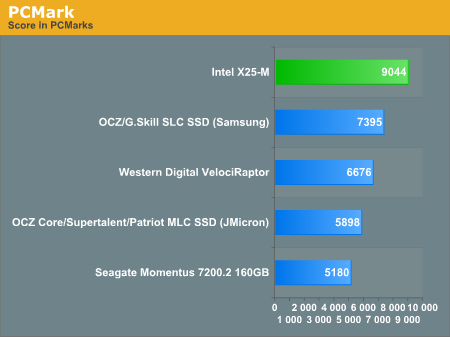
If we look at the individual test subsets of PCMark Vantage we can see the drive's strengths at work.
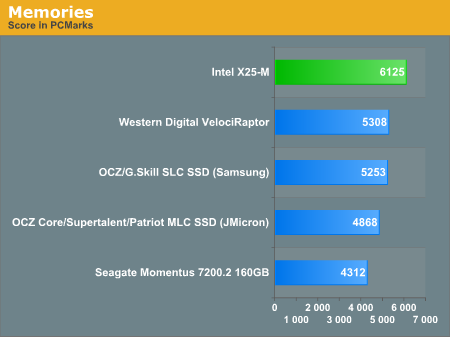
The memories suite for example includes a test involving importing pictures into Windows Photo Gallery and editing them, a fairly benign task that easily falls into the category of being very influenced by disk performance. The end result is a 15% performance advantage over the VelociRaptor, a 16.6% advantage over the Samsung SLC based SSDs and a 42% advantage over the 2.5" Seagate Momentus 7200.2 HDD - the X25-M is great for a desktop, but a miracle for a notebook.
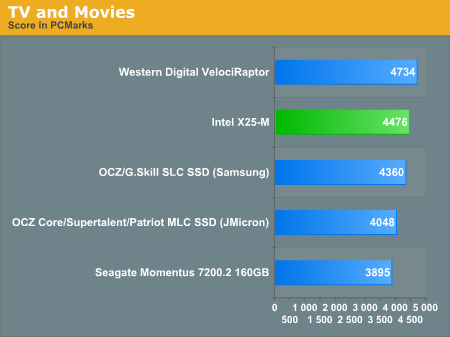
The TV and Movies suite shows that the X25-M won't always dominate. Here the tests are focused on video transcoding which is mostly CPU bound, but one of the tests involves Windows Media Center which tends to be disk bound. Despite the nature of the test, the X25-M competes at the top of the chart but is bested by the VelociRaptor. It's performance isn't bad, but not earth shattering. Again, compared to other notebook drives it is a dream come true.
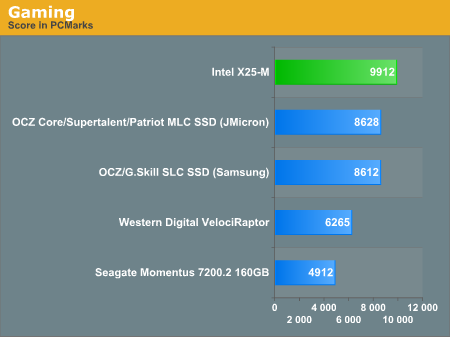
The gaming tests are very well suited to SSDs since they spend a good portion of their time focusing on reading textures and loading level data. All of the SSDs dominate here, but as you'll see later on in my gaming tests the benefits of an SSD really vary depend on the game. Take these results as a best case scenario of what can happen, not the norm. You can also see how tempting it is to opt for one of those JMicron based MLC SSDs, they perform quite well here - the test simply doesn't show the ugly side of living with them.
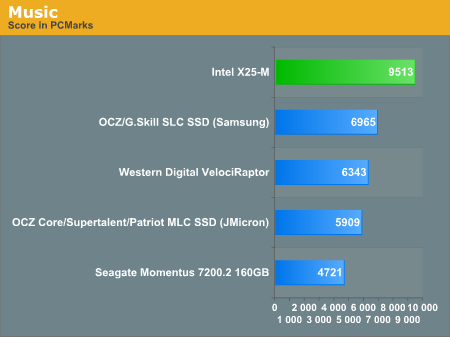
We're back to utter domination in the Vantage Music test. Here the main test is a multitasking scenario, which SSDs do quite well in: the test simulates surfing the web in IE7, transcoding an audio file and adding music to Windows Media Player (the most disk intensive portion of the test). The X25-M is nearly 60% faster than the VelociRaptor, around twice the speed of the Seagate Momentus 7200.2 and over 37% faster than the Samsung SLC based SSDs. When the X25-M is fast, it's very fast.
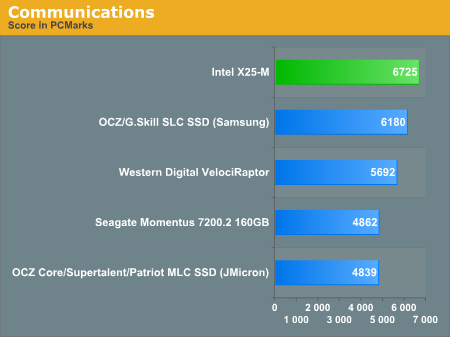
The Communications suite is made up of two tests, both involving light multitasking. The first test simulates data encryption/decryption while running message rules in Windows Mail. The second test simulates web surfing (including opening/closing tabs) in IE7, data decryption and running Windows Defender.
Despite the inclusion of Windows Defender, the X25-M's advantage over the VelociRaptor is only 18%. I would honestly expect more based on some of my other system scanning tests, but I believe the reason we're seeing general domination and not utter destruction is that the tasks being run alongside Windows Defender are quite light on the disk. Yes, I am nitpicking an 18% victory - this drive is that good. The SLC drives do well here but are no match for the X25-M. It's in tests like this that the X25-M really earns its keep, it delivers SLC performance at a much lower cost.
The Productivity test is awesome, let me explain:

In this test there are four tasks going on at once, searching through Windows contacts, searching through Windows Mail, browsing multiple webpages in IE7 and loading applications. This is as real world of a scenario as you get and it happens to be representative of one of the most frustrating HDD usage models - trying to do multiple things at once. There's nothing more annoying than trying to launch a simple application while you're doing other things in the background and have the load take seemingly forever.
Note that the test itself isn't very write intensive, so even the JMF602 based MLC drives do well here. I can attest to this as one of the things that drove me to put a SSD in my desktop was that I wanted my applications to pop up instantaneously, regardless of what I was doing. The pausing doesn't get a chance to rear its head, so all of the SSDs rule the playing field here. The X25-M delivers 2x the performance of the VelociRaptor here and is faster than every other drive. Enough said.










96 Comments
View All Comments
mindless1 - Thursday, September 11, 2008 - link
Sometimes the cure is worse than the problem.Gannon - Tuesday, September 9, 2008 - link
Don't worry derek I still heart you guys! :PHere's some cool software to check out (they have free trial version)
http://www.whitesmoke.com/landing_flash/free_hotfo...">http://www.whitesmoke.com/landing_flash...otforwor...
Maybe it will help escape complaints from the grammar nazi's, I think a lot of grammar is BS anyway. Language evolves constantly. It's a flexible tool to communicate.
Nihility - Monday, September 8, 2008 - link
An excellent review. The benchmark results were always confusing in the past. No one would try to explain why an SSD with seemingly superior specs can't outperform a 7200 drive in media test. Thanks for putting the time in to resolve this issue.As for buying a drive like that, the price is still too steep for me to consider and you definitely made it clear that buying a jmicro SSD is out of the question.
As for further testing, I'm very interested in seeing how a good SSD performs as an external drive over USB. The robustness and sturdiness of the drive is very important for something you lug around. We all know how bad bandwidth is over USB but I wonder how the latency will fair.
Keep up the good work.
kmmatney - Monday, September 8, 2008 - link
One of the other reviews I read said this SSD's controller will learn hard drive usage patterns, and get faster over time. Any tests of this feature?leexgx - Monday, September 8, 2008 - link
not sure how thay can lerni did wunder why thay never put any DRAM buffer on SSD drives as i was expecting SSD to suffer badly from lack of buffer any MLC drives basicly suck (16kb buffer per flash chip) unless its the intel MLC drive lol or an SLC drive seem mostly ok, but an intel SLC going to rock when thay get tested
Anand Lal Shimpi - Monday, September 8, 2008 - link
The Intel drive will learn hard drive usage patterns however it does so over an extremely long period of time, not something I could develop a test for in my time with the drive.Take care,
Anand
whatthehey - Monday, September 8, 2008 - link
...that doesn't think too much about HDD performance, particularly when we're talking about insane prices. Sure, rebooting and reloading all of your apps will feel much faster. Personally, when I reboot I walk into the kitchen or bathroom, walk back a few minutes later, and I don't notice the delays. Not to mention, I only reboot about once a month (usually when nVidia releases a new driver that I need to install).Another major problem I have is the tests as an indication of the "real world". Take the whole antivirus thing. I hate AV software and software firewalls, which is why I don't use Norton, AVG, Avast, McAfee or any other product that kills performance, sucks up memory, and only prevents virii/trojans after an update. AV software is just a BS excuse to pay a $60/year subscription and get nags every time your subscription expires. So there's on "real" scenario I don't ever encounter.
Archive extraction can be pretty disk intensive as well, but how often do you need to extract a 5GB archive? Okay, so let's say you're a pirate and you do that daily... great. Now you can extract faster, but you have an SSD that can only hold 14 or so large archives. It's a nice illustration of SSDs being faster, but it's completely impractical. I have a 1TB drive just for all the movies, images, music, and disc images I have floating around.
The tests show that SSDs can help a lot, but I for one use capacity far more. Between several games, my standard apps, and Vista I think I would use most of the 80GB. Then I think of the price and I could grab a couple VelociRaptors or even four 1TB Samsung F1 drives. I'll be truly impressed when I can get at least 320GB of SSD for less than $200. Actually, it's more like I want a good SSD with a reasonable capacity for under $100. Until then I'll just stick with my slower drives and avoid worst-case situations where HDD performance is a problem as much as possible.
The article was good, and I appreciate the info on the MLC issues with JMicron. That confirms my suspicion that inexpensive flash drives are worse than standard mechanical drives. Intel has addressed the problem, but price is now back to where we were last year it seems. I guess the real problem is that I'm just not enough of an "enthusiast" to spend this much money on 80GB of storage... not counting stuff like that old 4GB hard drive back in the day that set me back over $200. Give it a few more cycles and I think I'll be ready for SSDs.
PS - Also, who cares about $600 CPUs when you can buy $200 CPUs and overclock to higher performance levels? I don't think we'll ever see overclocked SSDs or HDDs.
DerekWilson - Tuesday, September 9, 2008 - link
i wouldn't be so sure about not seeing overclocked SSD ...as this article points out, intel puts a focus on reliability ... but to do so they do sacrifice performance. the voltage applied to the transistors to store data is calibrated to write the cells quickly while maintaining a good life span. a higher voltage could be applied that would allow the cells to be written faster but would reduce the number of writes that a cell could handle.
if intel says 100gb a day for 5 years ... i don't need that by a long shot. i would be very willing to sacrifice a lot of that for more speed.
i actually spoke with intel about the possibility of overclocking their ssd drives at idf -- it is something that could be done as it is controlled via the firmware of the drive. if intel doesn't convolute their firmware too much or if they allow enthusiasts to have the necessary control over settings at that level we could very well see overclocked SSDs ...
which would be very interesting indeed.
shabby - Monday, September 8, 2008 - link
I was so close in buying one of those ocz drives, in fact the reason i didnt buy it was because it was a special order that took 2 weeks.Excellent write up, especially about the jmicron/mlc "glitch".
OCedHrt - Monday, September 8, 2008 - link
Any reason why the WD GP drive does so well in the multitasking test? Even better than the VelociRaptor?